* You are viewing Posts Tagged ‘Encyclopaedism’
James Brown
October 12, 2010
Conferences and Workshops, Events, Project Updates
Tags: Communication, Encyclopaedism, Europe, History of Science, Jan Amos Comenius, John Aubrey, Millenarianism, Networks, Pansophia, Samuel Hartlib, Seventeenth Century, Universities
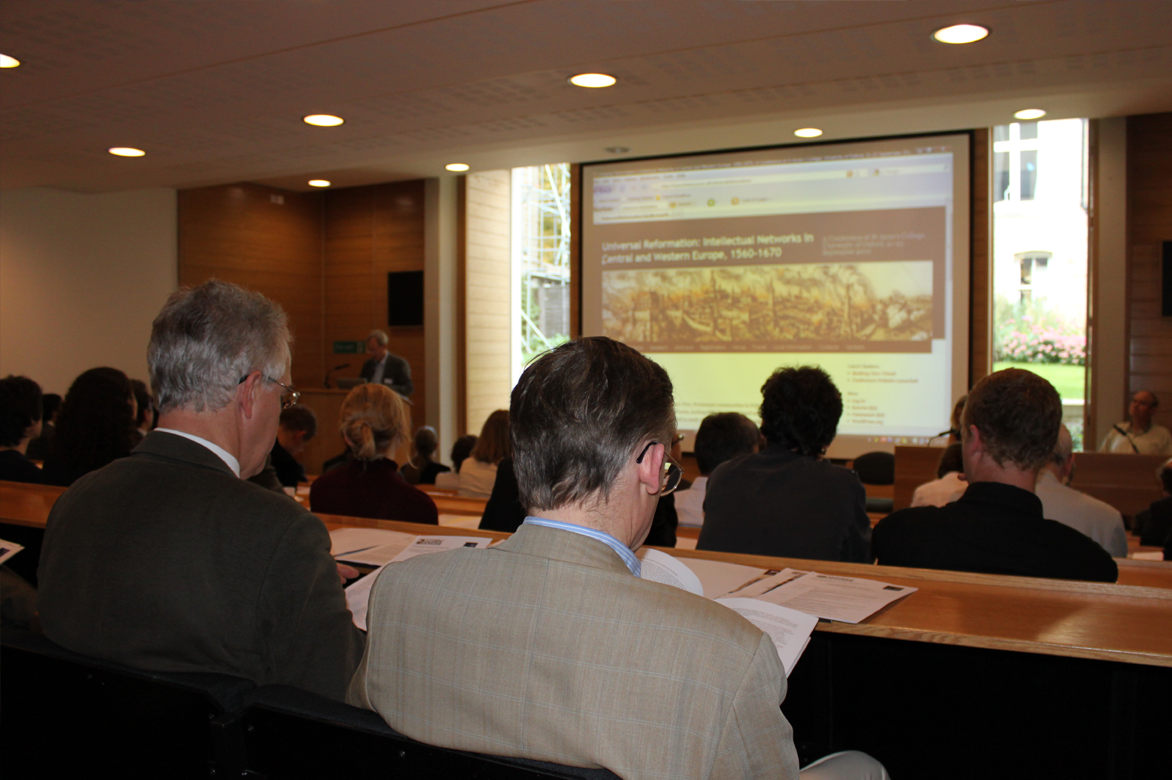
The opening plenary session.
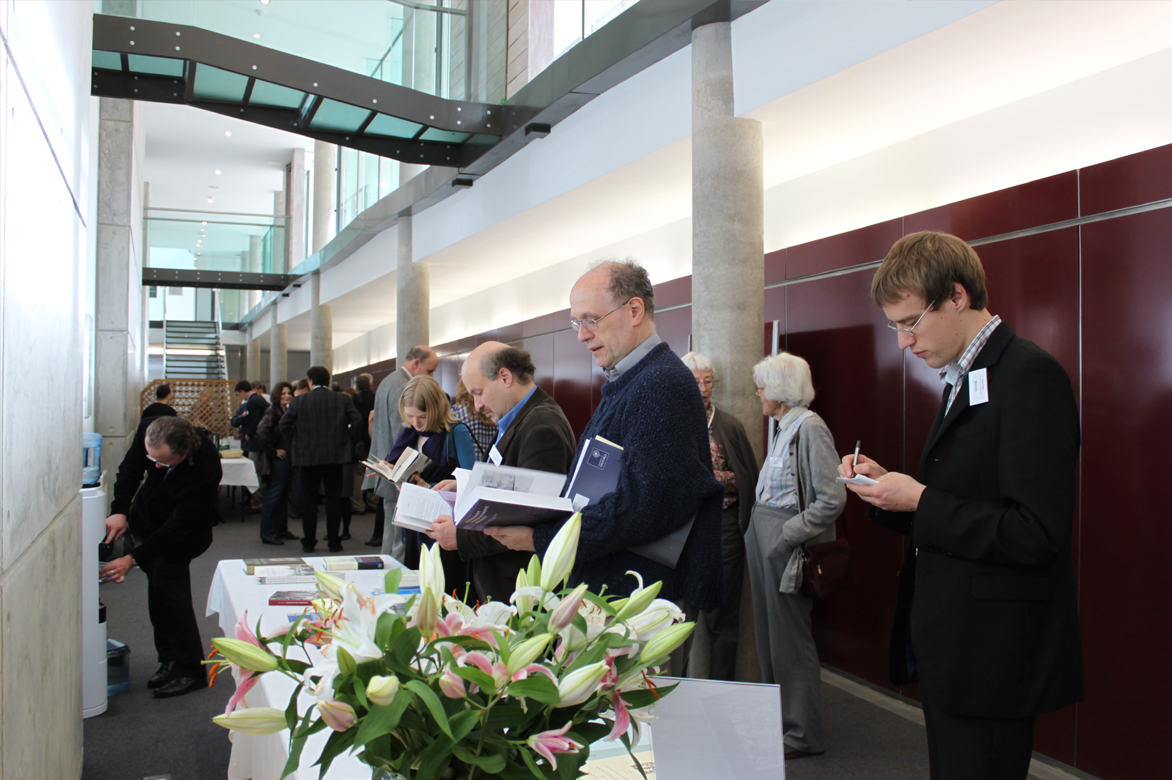
Relaxing in the foyer.
The Project’s inaugural conference, Universal Reformation: Intellectual Networks in Central and Western Europe, 1560-1670, took place at St Anne’s College on 21–23 September 2010. The event, which was attended by over ninety delegates, built on three preparatory European workshops (held in Prague, Cracow, and Budapest), and allowed forty-two emerging and established scholars from eleven countries to share their perspectives on the international networks and intellectual traditions brought into being by the upheavals of the Thirty Years War. Themes explored included institutional networks and intellectual exchange, encyclopaedia and pansophia, the early modern European media revolution, ecclesiastical reconciliation, and millenarianism, prophecy, and propaganda. Delegates also enjoyed a drinks reception in the Bodleian Library‘s historic Divinity School (incorporating a private viewing of the exhibition ‘My Wit was Always Working’: John Aubrey and the Development of Experimental Science), and were present for the prototype launch of our union catalogue. For further information, including speaker profiles and abstracts, please visit the conference microsite; for details of our 2011 event, please visit the conference webpage.
James Brown
July 16, 2010
Conferences and Workshops, Events, Project Updates
Tags: Communication, Encyclopaedism, Europe, Jan Amos Comenius, Networks, Pansophia, Politics, Religion, Samuel Hartlib, Seventeenth Century
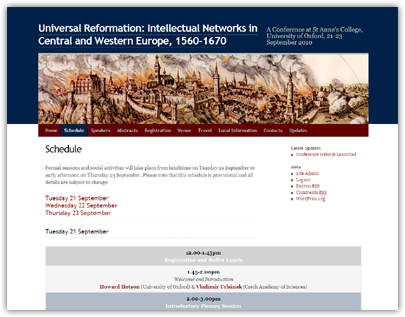 We are pleased to announce that booking is now open for ‘Universal Reformation: Intellectual Networks in Central and Western Europe, 1560-1670’, the first Project conference, which will take place at St Anne’s College, Oxford, on 21-23 September 2010. Organised by Howard Hotson and Vladimír Urbánek, the event will showcase the work of a diverse group of emerging and established scholars, many from east central Europe, who will converge on the intellectual networks and traditions engendered by the upheavals of the Thirty Years War. For provisional programme information, a steadily growing lists of speaker profiles and abstracts, and to book online, please see the new conference website. The deadline for registration is Friday 10 September.
We are pleased to announce that booking is now open for ‘Universal Reformation: Intellectual Networks in Central and Western Europe, 1560-1670’, the first Project conference, which will take place at St Anne’s College, Oxford, on 21-23 September 2010. Organised by Howard Hotson and Vladimír Urbánek, the event will showcase the work of a diverse group of emerging and established scholars, many from east central Europe, who will converge on the intellectual networks and traditions engendered by the upheavals of the Thirty Years War. For provisional programme information, a steadily growing lists of speaker profiles and abstracts, and to book online, please see the new conference website. The deadline for registration is Friday 10 September.
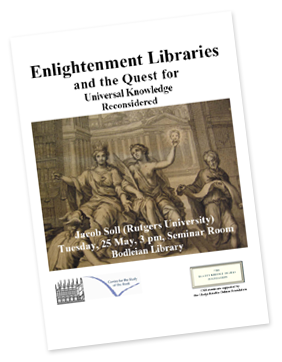 A lecture by Jacob Soll on ‘Enlightenment Libraries and the Quest for Universal Knowledge Reconsidered’ will take place at 3pm on Tuesday 25 May in the Seminar Room of the New Bodleian Library. Soll gained his doctorate in history at Cambridge University after completing a diploma of advanced studies at the École des Hautes Études en Sciences Sociales in Paris. His 2005 book, Publishing The Prince, about the afterlife and translations of Machiavelli’s work, won the Jacques Barzun Prize in Cultural History. Since then he has written about the birth of information culture in Europe, including research on the origins of state archives, on note-taking by early modern readers, on accountancy in seventeenth-century Holland, and the critical uses of historical evidence in early modern Europe. In 2009 he published The Information Master: Jean-Baptiste Colbert’s Secret State Intelligence System. Soll teaches at Rutgers University, New Jersey. He is a Consulting Editor of the Journal of the History of Ideas and a co-founder and Associate Editor of the new online journal Republics of Letters, founded at Stanford University with Dan Edelstein.
A lecture by Jacob Soll on ‘Enlightenment Libraries and the Quest for Universal Knowledge Reconsidered’ will take place at 3pm on Tuesday 25 May in the Seminar Room of the New Bodleian Library. Soll gained his doctorate in history at Cambridge University after completing a diploma of advanced studies at the École des Hautes Études en Sciences Sociales in Paris. His 2005 book, Publishing The Prince, about the afterlife and translations of Machiavelli’s work, won the Jacques Barzun Prize in Cultural History. Since then he has written about the birth of information culture in Europe, including research on the origins of state archives, on note-taking by early modern readers, on accountancy in seventeenth-century Holland, and the critical uses of historical evidence in early modern Europe. In 2009 he published The Information Master: Jean-Baptiste Colbert’s Secret State Intelligence System. Soll teaches at Rutgers University, New Jersey. He is a Consulting Editor of the Journal of the History of Ideas and a co-founder and Associate Editor of the new online journal Republics of Letters, founded at Stanford University with Dan Edelstein.
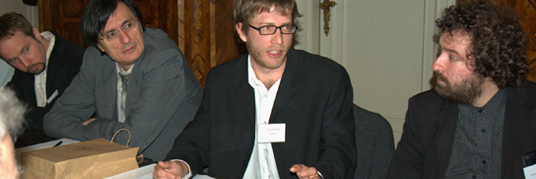
Workshop participants in discussion. © SOM
The third and final workshop in our extremely successful east-central European series took place last month in Budapest on the theme of ‘Encyclopaedism, Pansophia, and Universal Communication, 1560-1670′. The workshop was generously hosted and co-sponsored by Central European University and the Semmelweis Museum, Library, and Archives of the History of Medicine (with additional financial support from the Institute of Literary Scholarship of the Hungarian Academy of Sciences and the Institute for Literary Studies and Lingusitics of the University of Miskolc), and was organised by Márton Szentpéteri, Gábor Kecskeméti, Benedek Varga, and Márton Zászkaliczky. It allowed eighteen emerging and established scholars to converge on the related seventeenth-century ideas of collecting all knowledge into a single coherent system and of teaching all things to all men, as well as the networks and communicative strategies by which these universalist philosophies were disseminated across the fragmented geographical and political canvas of east-central Europe. For full details of the workshop, including abstracts and photographs, please see the workshop webpage. Themes addressed in the course of the workshop series will be drawn together in the international conference Universal Reformation: Intellectual Networks in Central and Western Europe, 1560-1670 (St Anne’s College, University of Oxford, 21-23 September).







 Join
Join 